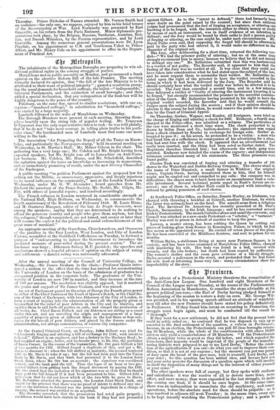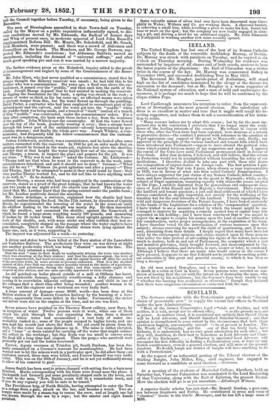gbt Vruttiutts.
The advent of a Protectionist Ministry threatens the resuscitation of the Anti-Corn-law League. One hundred and eight Members of the Council of the League met on Tuesday, at the rooms of the Parliamentary Reform Association in Manchester, to consider the steps advisable at the present political juncture,—the Earl of Derby having pledged himself at the beginning of the session to restore a duty on corn. Mr. George Wil- son presided, and in his opening speech advised an attitude of watchful- ness till after the new Premier should have stated his policy definitively in Parliament. If they found him intent on recurring to Protection, the struggle must begin again, and must be conducted till the result be "thorough." If they went for a new settlement, he did not feel that the present basis could be safely relied on : he confessed that he was disposed to mix up as essential to the final settlement of the question, a reform in Parliament; because, in an election, the Protectionists can poll 33 close boroughs return- ing 66 Members, while the whole of the constituencies with above 10,000 electors only yield a counterbalance of 20 Members. "If the Protectionists obtain a majority twice as great as they did before, and which repealed the Corn-laws, that majority would be impotent if the people of the manufac- turing districts were prepared to say to my Lord Derby, 'Better the condi- tion of the agriculturists if you can—do what you can to improve their con- dition, so that it is not at our expense ; but the moment you put one perm!' of duty upon the bread of the poor man, look to yourself, Lord Derby, and your order ; for this question has been settled once, and beware how you and your order provoke the discussion of a question again which will involve in itself the disposition of many things not to the interest of either yourself or your order.' "
l'he other speakers were full of energy, but they spoke with coolness and calculation: it was the resolve of all to devote more time, more effort, and more money, than were expended in the last struggle, to make the coming one final, if it should be once begun. At the same time, there was an indisposition to resuscitate the old machinery, and renew operations, before the absolute need for them should be palpable: so it was resolved to adjourn till n3xt Tuesday ; in the mean time, every eye to be kept intently watching the Protectionist policy ; and a power to
call the Council together before Tuesday, if necessary, being given to the Executive.
The men of Birmingham assembled in their Town-haR on Tuesday, ailed by the Mayor on a public requisition influentially signed, to dis- miss resolutions moved by Mr. Edmonds, the Radical of former days and Whig of present ones, in moderate approval of Lord John Russell's supplementary Reform Bill. Mr. Mentz, Mr. Scholefield, and Mr. Geach, local Members, were present ; and there was a crowd of Aldermen and councillors on the bench. The Members, and Mr. George Dawson, sup- ported Mr. Edmonda's resolutions' but Alderman Baldwin moved an amendment, including the demand of "universal suffrage," and after much good speaking pro and con it was carried by a narrow majority.
The farther evidence given at the Holmfirth inquiry added to the proofs of mismanagement and neglect by some of the Commissioners of the Reser- voirs.
Mr. John Hirst, who had never qualified as a commissioner, stated that he always thought the Bilberry reservoir was unsafe ; he had told this to his brother who was a commissioner. Six years ago, a flood rose above the em- bankment, it passed over the "puddle," and then sank into the earth of the bank. Joseph Sharpe deposed that he had assisted in making the reservoir.
i
In digging the foundation for the bank, a spring was struck n the rock ; a stream of water as thick as his leg came up ; no effectual means were taken to prevent danger from this, but the water flowed up through the puddling. David Porter, a contractor who had been employed to reconstruct part of the embankment and the culvert, said the water got into the " puddle " while the puddle-bank was being made, and a trench of "slush" instead of a trench of firm "puddle" was constructed, under the commissioners' orders. For a time after completion, the bank sank three inches a day, from the weakness of the 'middle. John Whitely saw the catastrophe. At first the water flowed over the top of the bank, gradually wearing it away ; then a stream burst through the lower part of the embankment—already honeycombed by per- colating streams ; and finally the whole gave way. Joseph Whitely, a i com- missioner, had frequently told his fellow-commumioners that the embank- ment was n a dangerous state.
Joshua Littlewood, architect, was a commissioner, and he looked after some matters connected with the reservoir. In 1846 he got an order made that an opening should be formed in the waste-pit, eighteen feet above the shuttles, in order that at that height the water might flow out of the reservoir. He sent Thorpe, a mason, to inspect the place and prepare for the job. It was not done. "Why was it not done ? " asked the Coroner. Mr. Littlewood- "Thorpe told one that when he went to the reservoir to do the work, some commissioners interfered, and said it should not be done." Coroner—" What else did he say ?" Witness (in great agitation and after a pause)—" They told Thorpe, that if he attempted to make it they would resist by force : they were parties Thorpe worked for, and he did not like to have anything more to do with it." Bo he desisted.
James Morton, a mason who had been employed in the construction of the reservoir, stated as a proof of the great leakage, that he had known the water sink two yards in one night while the shuttle was closed. This witness de- clared that Mr. Leather knew that the spring existed under the puddle-bank; but Mr. Leather positively denied the assertion.
Mr. James Armitage, a surveyor' explained how the shuttle had been rendered useless during the flood. On the 17th instant, by direction of Captain Moody, he superintended the lowering of the water in the reservoir until the swallow leading to the waste-pit was nearly dry. He then descended into the swallow, and examined the shuttle; against the framework of which he found a large stone weighing nearly 100 pounds, and measuring 17 inches by 20 inches broad. This stone stood upright against the frame- work of the shuttle, and, with some sticks and other rubbish that had ac- cumulated, completely stopped up the passage where the water ought to have one through. Three or four other smaller stones were lying against the larger one, and, as it were, supporting it.
The inquest was adjourned for a week—to yesterday.
A driver and stoker have been killed at the Bury station of the Lancashire and. Yorkshire Railway. The goods-train they were on was driven at night into another goods-train which was being "shunted" across the line. The Coroner's Jury returned a verdict,
That the men "came to their death by negligently driving the train into another which was shunting at the Bury station; and that the distance-signal, the lever of which is unprotected, had been reversed, and the signal thrown off after the arrival of the previous train, by some person or persons unknown. That it is the decided opinion of this Jury that one man cannot possibly attend to the duties of signalman, watchman, and pomtsman during the night; and that stop-signals ought to be adopted at this station, and night; one man specially appointed to their charge."
An old patched-up boiler placed outside of a mill at Oldham has burst, doing considerable damage, especially overthrowing a lofty chimney and catiaing it to overwhelm adjacent cottages. A woman and child in one of the cottages died a short time after being wounded ; another woman is in danger ; and the engineer and a workman are very badly hurt.
A large amount of damage—some 3000& worth—has been done at the Malden station of the Eastern Counties Railway, by the bursting of a loco- motive, apparently from some defect in the boiler. Fortunately, the stoker and driver were not on the engine at the time, and no one was hurt.
Seven miners have perished in the Thorney Hurst colliery, near Bury, by an irruption of water. Twelve persons were at work, when one of them struck his pick through the coal separating the mine from a disused colliery where water had accumulated ; a vast body of water im- mediately rushed in ; some of the people escaped to higher levels, and one man kept his mouth just above the flood. No aid could be given from the ehaft, for the water rose some distance up it. The mine is rather elevated, and a "loose" or drain existed for carrying off the water that might ordina- rily collect in the workings ; but this drain was too small to convey away the flood till a long time had elapsed. Then the peop.e who survived were gradually got out and the bodies recovered.
Farrow, deputy overman at Trimdon pit, South Durham, has been for- mally committed on a Coroner's warrant for manslaughter. He had been warned not to let the miners work in a particular spot; he did allow them ; an explosion ensued, three men were kille41, and Farrow himself was very badly burnt. This was on the 26th of January, and he is not yet sufficiently strong to allow of his removal to gaol.
James Smith has been sent to prison charged with setting fire to a barn near Bideford. Marks corresponding with his boots were found near the place. A blacksmith had formerly put some peculiarly-shaped nails in the boots, and he said to the man, "Now, Smith, yours will be a remarkable track, and if you do any roguery you will be sure to be traced."
The Providence brig, of North Shields, having attempted to enter the Tees IS a refuge from a gale, struck on the bar, and became a wreck. Two at- tempts were made by a steam-tug to rescue the crew, and at length one lad NVa5 drawn through the sea by a rope ; but the master and eight hands Perished.
Some valuable mines of silver lead ores have been discovered near Caer- philly in Wales ; Withers and Co. are working them. A charcoal-burner, in removing a small tree, while levelling a place to make his hut, found ten tons or more on the spot ; but the company are now busily engaged in sink- ing a pit, and driving alevel for an additional supply. Mr. John Edmunds of Pontypridd is working another rich mine recently opened.



























 Previous page
Previous page